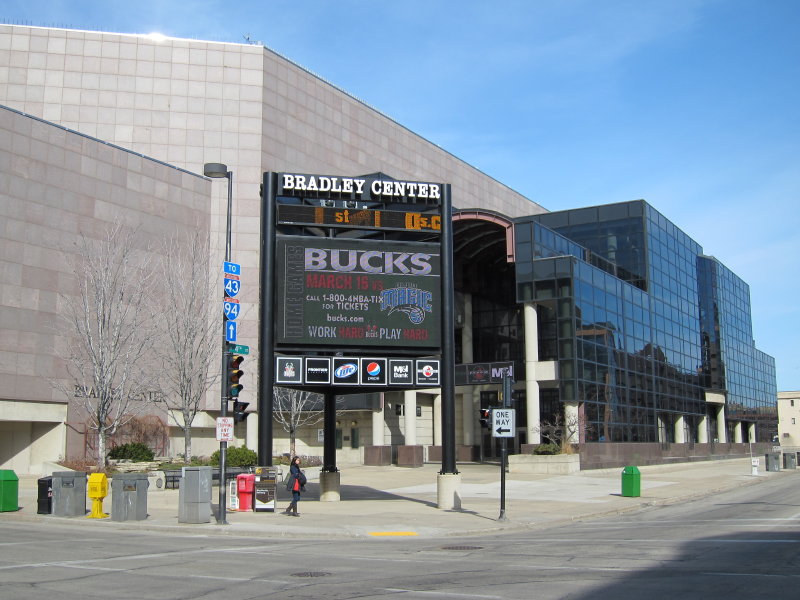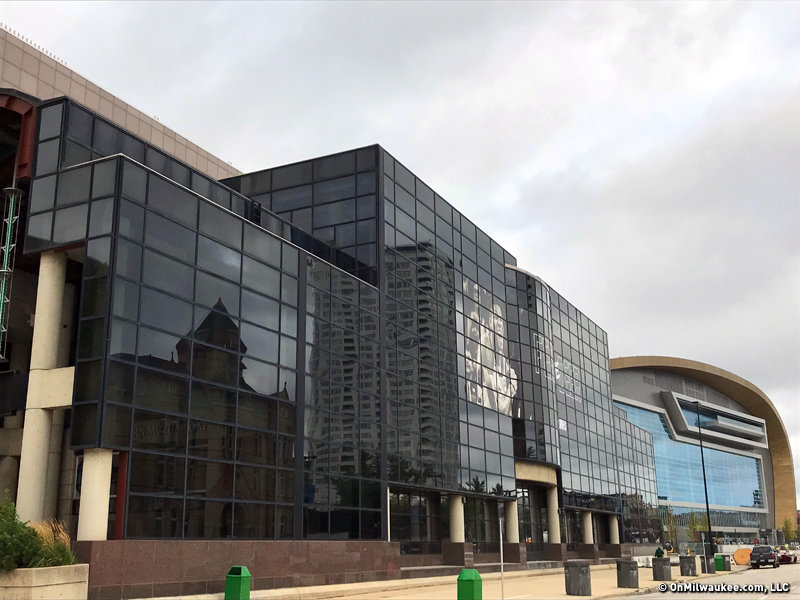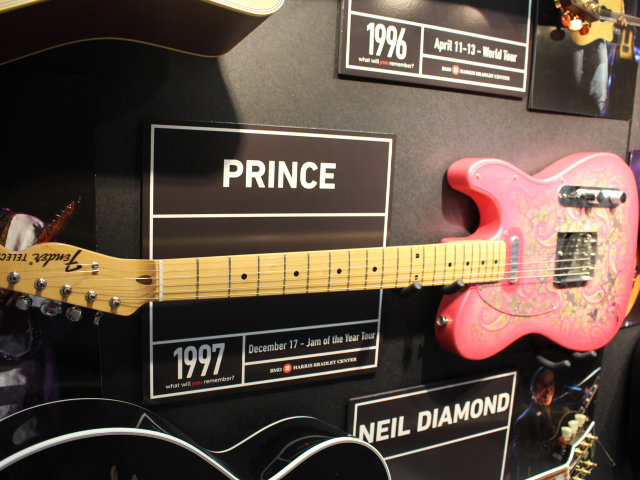I have never cared for the obliteration of traditional sports venue names for the sake of the almighty dollar.
Candlestick Park was never Monster.com Park, 3Com Park, or any derivation thereof. The home of the Oakland A's and Raiders has been called the Oakland Coliseum, Network Associates Coliseum, Overstock.com Coliseum, McAfee Coliseum, and now O.co Coliseum. The home of the Miami Dolphins already has had the corporate names of Pro Player sports apparel, Land Shark beer, and Sun Life Insurance, and is expected to have yet another new name within two years.
Good grief. Since it is nearly impossible to keep them all straight, I simply choose not to try. For example, U.S. Cellular Field is still "New Comiskey" and for Heaven's sake, the original home of the Bucks shall and forever be the MECCA Arena.
I would say something snarky about Miller Park, but that is what it has always been. Besides, even if there were no dollars attached, Fred Miller did so much to bring the Braves to Milwaukee before his tragic plane crash in 1954 that it would not have been completely out of bounds to honor a city baseball pioneer with his name on the game's finest cathedral.
My point is not to denigrate the outstanding contributions of BMO Harris Bank, nor the other "Champions of the Community" that have heroically stepped in and slapped an enormous, albeit temporary, bandage on the aging home arena for the Bucks, Golden Eagles, Admirals, and Mustangs. The news is both fantastic and encouraging.
But that still doesn't mean "BMO Harris Bradley Center" will ever colloquially be used when anyone utters the name of the late Jane Bradley Pettit's $90 million gift to the community she so dearly loved back in 1985. I cannot imagine that even BMO Harris would expect that after the building has been such a central figure of the landscape of the city for the last quarter-century.
"The Bradley Center has a net annual economic impact of more than $80 million in metro Milwaukee," Tim Sheehy, President of the Metro Milwaukee Association of Commerce said Monday morning announcing the official name change. "It's a tremendous community asset and job creator."
The news itself of course was welcomed for a facility that was built just a few years too soon. Today, the HVAC system needs repair, the lighting is outdated, the suites look exactly as they did in 1988, and just general maintenance and upkeep dictate that until a suitable replacement can be built, the Bradley Center will continue to soldier on.
Unfortunately, if there was any possible way the old MECCA could have lasted another decade, the mistakes of construction of the mid-1980s, and the very need for a replacement could have been avoided.
The footprint of the building is too small. There is not an attached entertainment district. The Wisconsin Center operates independently right next door and features two venues that have been colossal wastes of money – the always empty white elephant that is the Milwaukee Theatre, and the almost as empty Frontier Airlines Center. And while it is debatable how much those venues hurt the Bradley Center, they certainly don't help.
Looking at the events calendar for the old auditorium, there are a grand total of seven (!) events that are booked in the next 12 months. And while the Frontier Airlines Center is being utilized more often, outside of the annual events like the boat show and the auto show, there are no conventions that you could consider major heading to our fair city, driving traffic (and life) Downtown.
That leaves the Bradley Center to drum up what business it can during the long, cold, desolate winters. And while it was spectacular when it opened, in retrospect it was more of an indictment of what we did not have in our community: a major indoor civic facility.
But the plans were grandiose when the building opened in October 1988. Since Mrs. Pettit was married to a Hockey Hall of Famer and they already owned the Admirals, the NHL was sure to eventually include Milwaukee given a suitable facility.
That is, until Lloyd Pettit looked at the bill the league was trying to sock them with for an expansion team and said 'thanks, but no thanks.'
Since then, we have been saddled with a building constructed for a hockey in a basketball city. Shortly after the Bradley Center opened, better arenas with more square footage, clearer sightlines, and year-round amenities began popping up in cities like Boston, Toronto, Portland, Philadelphia, and especially Indianapolis, rendering ours as a very young relic.
Just as the NBA's building boom was taking place (15 new NBA arenas opened in the 1990s) Milwaukee was embroiled in the fight of its life to secure funding for Miller Park. The mere thought of replacing the Bradley Center in its infancy would have been laughed at.
Today, however, there is no escaping the reality that we have the NBA's oldest non-renovated arena. Thursday's announcement that the Golden State Warriors were planning to move to their own state-of-the-art facility along the San Francisco Bay using only private financing represents both boldness and optimism.
Boldness because the generations-old stadium game almost dictates that local communities starving for the prestige of major league sports will pony up most (if not all) of the funds necessary for construction. Optimism because if the Warriors ownership group can raise $500 million by themselves, surely a public-private partnership can raise the approximate $350 million needed to build the Bradley Center's eventual replacement here.
But aside from the desperately needed funds to continue operating the Bradley Center as a viable NBA venue, Wisconsin's business leaders are coming together as one and beginning the necessary conversations about replacing the aging arena.
For the last several years, the issue has been danced around and spoke of only in abstract terms. But with Sen. Kohl's recent statements that while the Bradley Center can still house the Bucks for several seasons to come, planning for the long-term health of the organization has to begin now.
The Bradley Center will always be the Bradley Center, no matter what corporate name will ever be attached to it. So while BMO Harris Bank can crow about their name on Milwaukee's downtown entertainment destination while the rest of us simply ignore it, what they, along with Harley-Davidson, Kohl's Department Stores, Northwestern Mutual and Rockwell Automation have done is nothing short of spectacular. Not to extend the life of Mrs. Pettit's generosity, but rather to recognize the looming threat of the Bucks short shelf-life without a new home.
It is a lesson that has been learned the hard way in Seattle, who saw their Sonics leave after years of bad basketball in antiquated Key Arena. But they got lucky. In the NBA Draft Lottery, a young man named Kevin Durant fell to the Sonics. One year later, they nabbed another All Star in point guard Russell Westbrook. The foundation for Sonics success was set. Or so they had thought.
Today, as the Emerald City weeps, their beloved team is just four wins from a berth in the NBA Finals. You might know the Sonics today as the Oklahoma City Thunder after the team relocated after two generations in Seattle because they could not come together as a community and build the team a suitable arena.
Some in Oklahoma are wearing shirts saying "Thank you, Seattle" as a way of either mocking their myopic ways or in genuine gratitude for allowing their club to walk.
We too should be wearing those shirts here in Milwaukee. Not for anything the Thunder are doing right now; but rather for the lesson they had to learn the hard way.
Doug Russell has been covering Milwaukee and Wisconsin sports for over 20 years on radio, television, magazines, and now at OnMilwaukee.com.
Over the course of his career, the Edward R. Murrow Award winner and Emmy nominee has covered the Packers in Super Bowls XXXI, XXXII and XLV, traveled to Pasadena with the Badgers for Rose Bowls, been to the Final Four with Marquette, and saw first-hand the entire Brewers playoff runs in 2008 and 2011. Doug has also covered The Masters, several PGA Championships, MLB All-Star Games, and Kentucky Derbys; the Davis Cup, the U.S. Open, and the Sugar Bowl, along with NCAA football and basketball conference championships, and for that matter just about anything else that involves a field (or court, or rink) of play.
Doug was a sports reporter and host at WTMJ-AM radio from 1996-2000, before taking his radio skills to national syndication at Sporting News Radio from 2000-2007. From 2007-2011, he hosted his own morning radio sports show back here in Milwaukee, before returning to the national scene at Yahoo! Sports Radio last July. Doug's written work has also been featured in The Sporting News, Milwaukee Magazine, Inside Wisconsin Sports, and Brewers GameDay.
Doug and his wife, Erika, split their time between their residences in Pewaukee and Houston, TX.







